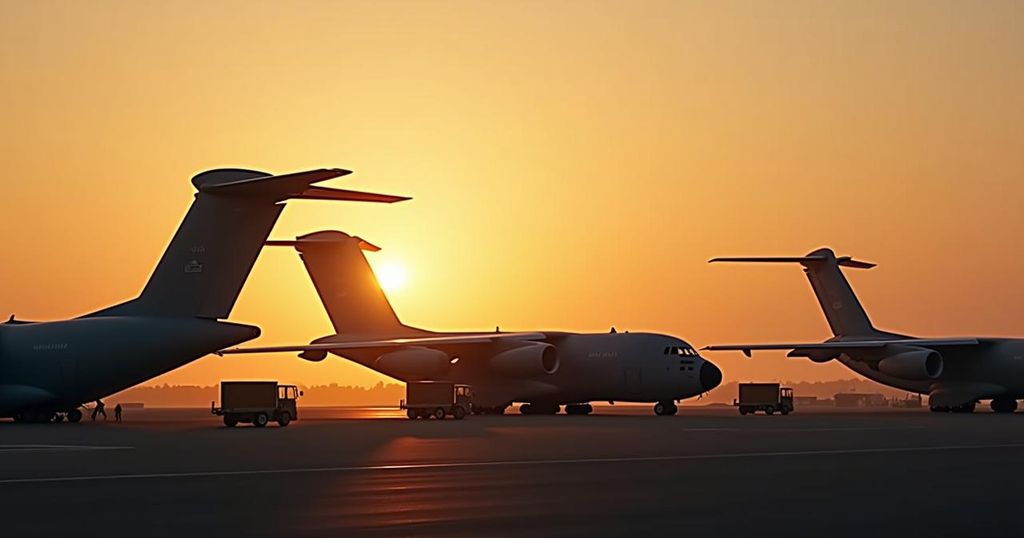Escalating Tensions: Egypt’s Military Support to Somalia and Its Implications
Egypt delivered its second weapons shipment to Somalia in September 2024, including anti-aircraft guns and artillery, amid tensions related to the Grand Ethiopian Renaissance Dam. The shipment raises concerns about weapon accessibility to al-Shabaab and signals a willingness from Egypt to confront Ethiopia militarily. The development of a naval base by Ethiopia in Somaliland could further complicate regional dynamics.
On September 23, 2024, Egypt completed its second weapons shipment to Somalia within a month, a move that raises concerns of escalating tensions in the Horn of Africa. Delivered by an Egyptian warship, the artillery included anti-aircraft guns, which could potentially provoke confrontations among Egypt, Ethiopia, Somalia, the self-declared region of Somaliland, and other regional entities. The relationship between Egypt and Somalia has strengthened throughout 2024, particularly as both nations have grown increasingly distanced from Ethiopia. The source of tension lies predominantly in the discord over the Grand Ethiopian Renaissance Dam (GERD), which Egypt perceives as a significant threat to its vital water resources. Negotiations have been unsuccessful since construction began in 2011, with efforts, including a U.S.-mediated agreement attempt in 2019, failing to yield a sustainable resolution. Somalia’s discontent with Ethiopia surged following a preliminary agreement made in January, wherein Ethiopia secured a land lease with Somaliland for a port in exchange for acknowledging Somaliland’s independence. Somalia maintains that Somaliland is part of its sovereign territory. In response to the latest arms shipment, the Somaliland government has expressed apprehension regarding the potential for these weapons to be appropriated by Islamist factions such as al-Shabaab. Experts regarding the situation have cautioned against the implications of Egypt’s military support to Somalia. Bill Roggio, Senior Fellow and Editor at the Foundation for Defense of Democracies (FDD), noted, “Egypt’s shipment of weapons to Somalia runs the risk of dangerous weapons systems, such as anti-aircraft guns and artillery, falling into the hands of al-Shabaab — al-Qaeda’s branch in East Africa.” The precarious nature of the Somali armed forces, along with the presence of Ethiopian troops, adds layers to the potential instability in the region. Mariam Wahba, an FDD Research Analyst, emphasized that “Egypt’s delivery of a second weapons shipment to Somalia underscores Cairo’s frustration with Ethiopia over the Nile dam. By deepening its military ties … Egypt is signaling its readiness to confront Ethiopia militarily. This situation only heightens the security risk in the Horn of Africa.” The strategic significance of Somaliland’s coastal access is further emphasized in the context of escalating threats from Houthi attacks, which have severely disrupted global shipping and affected Egypt’s Suez Canal revenues. Ethiopia’s interest in developing a naval base on Somaliland’s coast suggests a potential shift in power dynamics within the region, arguably enhancing maritime security in the Gulf of Aden.
The delivery of arms from Egypt to Somalia occurs amid escalating tensions surrounding the Grand Ethiopian Renaissance Dam (GERD) dispute. Egypt perceives the GERD as a critical threat to its water rights, given that the Nile River is its primary water source. Meanwhile, Ethiopia’s agreements with Somaliland, particularly regarding port access and potential independence recognition, have further strained relations with Somalia. The presence of al-Shabaab, an active Islamist militant group in Somalia, raises concerns about the danger of weapon proliferation in the region, complicating the security situation in the Horn of Africa.
In summary, Egypt’s recent arms shipments to Somalia reflect a strategic pivot that heightens tensions with Ethiopia while potentially exacerbating instability in Somalia itself. With the backdrop of the GERD conflict, shifting alliances, and the specter of al-Shabaab’s influence, the situation demands careful monitoring to avoid further escalations and ensure regional security.
Original Source: www.fdd.org




Post Comment